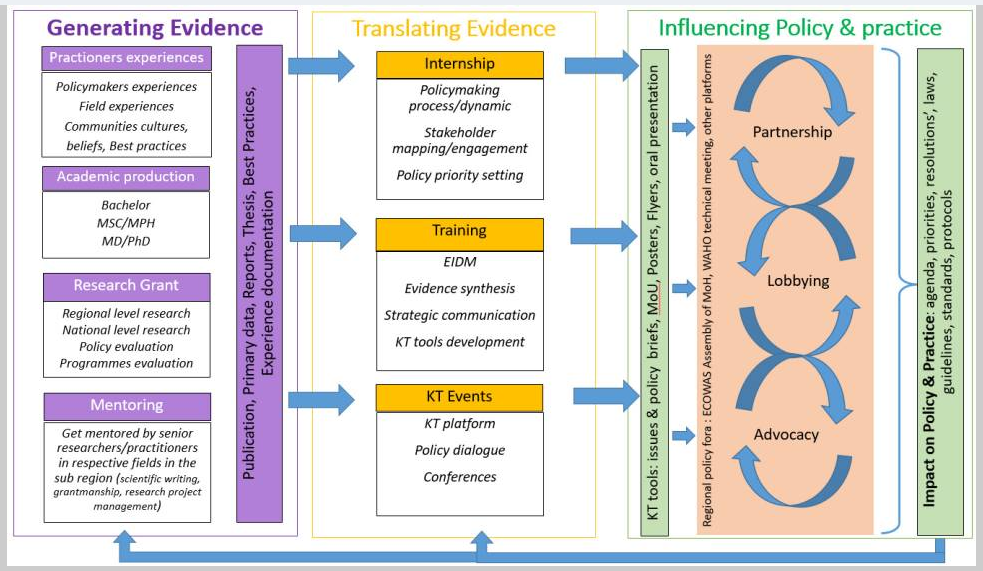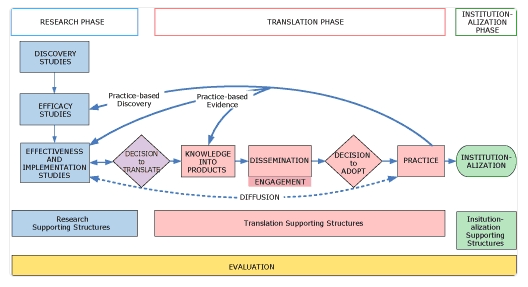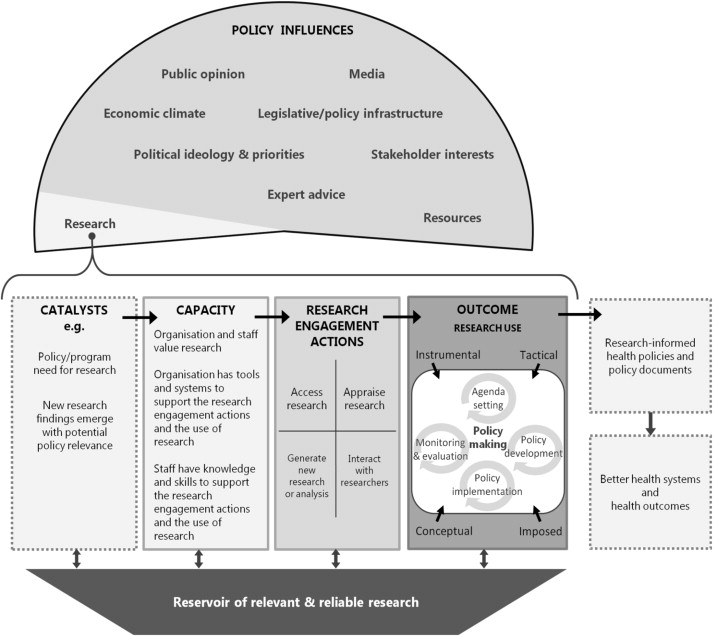
The evidence generation and collaboration of knowledge translation frameworks into policy is fundamental for research influence on policy decisions. Despite substantial progress in evidence generation and gathering, there is a need to strengthen the generation and use of research evidence in health policy and practice decision-making and implementation. We need strategies and frameworks that can foster the use of research evidence in health policy and practice. This section presents a selection of frameworks that have been reviewed and with a focus on strengthening research use through communities of practice, stakeholder mapping, advocacy, bridging research and practice, and addressing the lack of systematic organization in knowledge translation. These resources will provide you with skills to influence health-related decisions and a checklist that can improve policy impact from a research project.
WANEL Strategies →
There are different strategies and interventions to strengthen the generation and use of research evidence in health policy and practice decision-making and implementation. These include developing a Community of Practice, a repository of health policy and systems research (HPSR) evidence, stakeholder mapping, and engagement for action, advocacy, and partnership.
Knowledge to Action →
The Knowledge to Action (K2A) Framework outlines three phases - research, translation, and institutionalization and the decision points, interactions, and support structures within the phases that are necessary to move knowledge into sustainable action. It is designed for facilitators, practitioners and researchers, providing a structured approach to bridging research and practice, and control of chronic diseases.
Translating Research for Impact →
A free online course to learn how to influence decisions made by elected officials, government agencies, non-government organizations, and health systems that impact the health of populations. A solid foundation of skills for effectively translating and disseminating research.
Research for Policy tool →
Effective knowledge utilization in policy making requires proper alignment between researchers and policymakers. This tool serves as a checklist for both researchers and policymakers, helping them address key alignment areas throughout a research project. Maintaining alignment between these two groups during the research process can be challenging, making this tool particularly valuable for all researchers seeking to align their work with policy needs.
The SPIRIT Action Framework →
The SPIRIT (Supporting Policy In Health with Research: an Intervention Trial) Action Framework was designed to enhance the integration of research into policy by providing a structured method for selecting and evaluating strategies that support research utilization. This framework was developed in response to the proliferation of knowledge translation strategies, which, despite their increasing prevalence, often lack systematic organization and empirical validation.
SAGE (Staff Assessment of enGagement with Evidence) →
This includes a trial evaluating the effectiveness of a multifaceted program to improve the capacity of health policy agencies to use research in the development of policies and programs, entitled SPIRIT (Supporting Policy in Health with Research: an Intervention Trial). SAGE is based on the SPIRIT Action Framework which describes the steps, barriers, facilitators, and contextual influences along the pathway to research use in policymaking.
WANEL Strategies
Background
There are different strategies and interventions to strengthen the generation and use of research evidence in health policy and practice decision-making and implementation. These include developing a Community of Practice, a repository of health policy and systems research (HPSR) evidence, stakeholder mapping, and engagement for action, advocacy, and partnership.
Approaches for improving evidence uptake beyond traditional knowledge translation activities include:
- The use of cultural considerations in presenting research results and mentoring younger people
- The presentation of results in the form of solutions to political problems for decision-makers, and
- The use of research results as advocacy tools by civil society organizations.
Researchers should develop skills in stakeholder mapping, advocacy, effective presentation of research results, leadership skills, networking, and network analysis.
Six Key Knowledge Translation Strategies are key in promoting evidence in policy and practice:
- Establish a repository for evidence generated from research conducted by network members or important studies in the region.
- Develop stakeholder mapping that strengthens health systems and influences health policies.
- Formation of communities of practice through the different thematic working groups or topics.
- Stakeholder’s commitment to action.
- Advocacy through the WANEL ambassador to promote the network in regional spaces to create linkages.
- Partnership with different sub-regional institutions and bodies.
Six Knowledge Translation Interventions that can translate the strategies into action are:
- Problem-solving presentation of evidence.
- Community outreach for behavioral change.
- Provision of evidence to CSOs as an advocacy tool.
- Cultural consideration in evidence presentation.
- Organising regional conferences.
- Supporting regional institutions in achieving their mission.
The interventions reflect outside-the-box thinking and are aimed at various levels, from field actors such as NGOs, CSOs, and the community to regional institutions. The core skills required include; advocacy, strategic communication, effectively presenting research findings in an engaging and actionable manner, collaborating with decision-makers, stakeholder mapping and engagement, leadership, networking and network analysis, and contextual understanding of the policy formulation process. Capacity building in cost analysis of interventions, systems thinking and language skills are key.
To develop these skills and capacities, short courses, summer schools, practical training workshops, and internships in specialized institutions with mentors are ideal. Language exchange between network members is resourceful.
Conclusion
Strengthening the generation and use of research evidence in health policy and practice decision-making requires targeted capacity-building efforts and coordinated multiple interventions that engage researchers, decision-makers, and practitioners synergistically.
The Framework model

Reference
Johnson, Ermel & Okedo-Alex, Ijeoma & Gbogbo, Sitsofe & Okpani, Arnold & Defor, Selina & Obi, Felix & Dossou, Jean-Paul & Eboreime, Ejemai. (2022). The experience of a regional network of health policy and systems actors in translating evidence into policy and action in West Africa. Ghana Medical Journal. 53. 96-104. 10.4314/gmj.v56i3s.11.
Knowledge to Action
Background
The Knowledge to Action (K2A) Framework outlines three phases - research, translation, and institutionalization and the decision points, interactions, and support structures within the phases that are necessary to move knowledge into sustainable action. It is designed for facilitators, practioners and researchers, providing a structured approach to bridging research and practice.and control of chronic diseases.
One of the most efficient ways to maximize limited public health resources is applying, proven, evidence-based interventions. In this context, “translation” refers to the process and steps needed and taken to ensure effective and widespread use of evidence-based programs, practices, and policies. Thus, translation is a term for putting knowledge from research or practice into action.
The K2A Framework is not a causal or theoretical model but a schematic for processes that can be used by practitioners gathering practice-based discoveries or evidence and by researchers developing and testing interventions.
The framework is designed to be adaptable across various diseases, conditions, or risk factors, as well as for different types of interventions - whether programs, policies, or practices. It emphasizes the involvement of all key stakeholders in the research and practice communities, including scientists, administrators, policymakers, support systems, and practitioners. It also highlights critical points of intersection between these groups.
K2A Framework identifies three phases in the overarching processes of moving from scientific discoveries into routine public health practice: research, translation, and institutionalization.
The research phase encompasses:
- the development and testing of scientific advancements to assess the suitability for translation and
- the use of traditional efficacy, effectiveness, and implementation research metrics.
The Framework model

Conclusion
To ensure quality practice change and institutionalization, structures must be created and sustained to support interventions.
Reference
Wilson KM, Brady TJ, Lesesne C; NCCDPHP Work Group on Translation. An organizing framework for translation in public health: the Knowledge to Action Framework. Prev Chronic Dis. 2011 Mar;8(2):A46. Epub 2011 Feb 15. PMID: 21324260; PMCID: PMC3073439.
Translating Research for Impact
Background
A free online course to learn how to influence decisions made by elected officials, government agencies, non-government organizations, and health systems that impact the health of populations. A solid foundation of skills for effectively translating and disseminating research.
For many health policy and health economics researchers, converting research into formats that are understandable and actionable by the public and policymakers can be a significant challenge. As a result, valuable research evidence and findings often fail to influence practice and policy.
Translation and dissemination are key strategies for overcoming these barriers by making research results more accessible and engaging. This free, online course focuses on essential tools and skills for translation and dissemination for researchers, including leveraging social media (Twitter), writing op-eds, crafting blogs and briefs, engaging with the media, and interacting with policymakers.
These training modules can help identify and communicate with target audiences and develop skills in producing content that speaks to these audiences, such as briefs, blogs, and op-eds.
Conclusion
This curriculum is specifically designed for researchers in the fields of health economics, health services, and health policy to improve a researcher's ability to translate and communicate findings to a variety of audiences, including policymakers and the public.
Reference
Amplify@LDI: Translating Research for Impact. A free, online course focusing on key tools and skills in translation and dissemination for researchers.
Research for Policy tool
Background
Effective knowledge utilization in policy making requires proper alignment between researchers and policymakers. This tool serves as a checklist for both researchers and policymakers, helping them address key alignment areas throughout a research project. Maintaining alignment between these two groups during the research process can be challenging, making this tool particularly valuable for all researchers seeking to align their work with policy needs.
The 8 Key alignment areas identified include:
- Goal
- Quality
- Relevance
- Timing
- Presentation of research findings
- Roles and authorities of stakeholders
- Consultative structures and vertical alignment within organizations
- Organizational environment.
To develop this tool, a cross-case analysis of three research projects commissioned by policymakers was conducted. Findings were integrated into a practical tool with reflection questions for researchers.
The tool was tested with project managers from three new research projects, and feedback led to the inclusion of illustrative examples from case studies. Adjustments were made to improve accessibility, such as adding clickable links. Suggested expansion of the tool’s audience to include policymakers.
The current tool includes 23 questions covering all critical alignment areas. The users can assess whether each question is relevant to their specific project at a given point in time and decide whether the answers require alignment efforts.The tool has open-ended questions to promote awareness and critical reflection on the process aspects of the project, while taking into account the alignment pitfalls that were identified in the case studies by contribution mapping. This increases researchers’ sensitivity to the context of their project and to the policymaking process.
By becoming more context-sensitive, researchers will be better equipped to recognize and act on the importance of aligning with the commissioning and other organizations, ultimately enhancing the impact of their work. At the same time, they will be more capable of acknowledging the different roles and responsibilities of researchers and policymakers, while maintaining their independence.
Conclusion
Alignment between research and policymaking requires continuous effort and a keen awareness of the process. The Research for Policy tool provides practical guidance for improving alignment. It supports researchers in reflecting on their work and making context-sensitive decisions that foster stronger connections between research and policy.
Reference
Hegger, I., Marks, L.K., Janssen, S.W. et al. Research for Policy (R4P): development of a reflection tool for researchers to improve knowledge utilization. Implementation Sci 11, 133 (2015). https://doi.org/10.1186/s13012-016-0496-1
The SPIRIT (Supporting Policy In health with Research: an Intervention Trial) Action Framework
Background
The SPIRIT (Supporting Policy In Health with Research: an Intervention Trial) Action Framework was designed to enhance the integration of research into policy by providing a structured method for selecting and evaluating strategies that support research utilization. This framework was developed in response to the proliferation of knowledge translation strategies, which, despite their increasing prevalence, often lack systematic organization and empirical validation. The SPIRIT framework has been tested in real-world policy settings, where it has sucessfully guided the selection and evaluation of strategies to promote research utilization.
The framework suggests a four-step pathway for research use in policy:
- Catalysts for Research Use: A stimulus or external factor, such as a policy crisis, public demand, or an urgent health issue, that prompts policymakers to seek research-based solutions;
- Organizational Capacity: The ability of a policy agency to effectively engage with research, including having skilled personnel, supportive policies, and access to relevant research;
- Engagement Actions: The specific strategies used by policymakers to interact with research, including accessing evidence, appraising its quality, commissioning new research, and collaborating with researchers.
- Research Use: The application of research in policy making, which can be instrumental (directly informing decisions), conceptual (shaping thinking), or strategic (used to justify actions).
The SPIRIT Action Framework hypotheses that a catalyst is required for the use of research, the response to which is determined by the capacity of the organisation to engage with research. Where there is sufficient capacity, a series of research engagement actions might occur that facilitate research use. These hypotheses are being tested in ongoing empirical work.
The Framework model

Conclusion
The SPIRIT Action Framework can guide conceptually-informed practical decisions in the selection and testing of interventions to increase the use of research in policy.
Reference
Redman, Sally & Turner, Tari & Davies, Huw & Williamson, Anna & Haynes, Abby & Brennan, Sue & Milat, Andrew & O'Connor, Denise & Blyth, Fiona & Jorm, Louisa & Green, Sally. (2015). The SPIRIT Action Framework: A structured approach to selecting and testing strategies to increase the use of research in policy. Social Science & Medicine. 136-137C. 10.1016/j.socscimed.2015.05.009.
SAGE (Staff Assessment of enGagement with Evidence)
Background
This includes a trial evaluating the effectiveness of a multifaceted program to improve the capacity of health policy agencies to use research in the development of policies and programs, entitled SPIRIT (Supporting Policy in Health with Research: an Intervention Trial). SAGE is based on the SPIRIT Action Framework which describes the steps, barriers, facilitators, and contextual influences along the pathway to research use in policymaking.
This framework underpinned SPIRIT by informing the selection of intervention strategies and outcome measures used in the trial. More generally, however, the framework aims to guide a systematic approach for selection and testing of strategies for building capacity for research use.
The framework does not assume that policymaking is a linear, predictable process, but provides a simplified schematic to capture the process through which research informs policymaking. Once the need for research to inform policy is identified, policymakers initiate a number of (A) research engagement actions such as (i) searching for and (ii) obtaining research, (iii) appraising its relevance and (iv) quality, (v) generating new research or analyses, and (vi) interacting with researchers. Once relevant research has been obtained and/or generated, it can then be (B) used to inform policy making.
This may take place in four ways: (i) research may directly influence what issues to prioritize, or what decisions should be made with regard to the identified issue(s), including decisions to reject or disinvest in existing policies (instrumental); (ii) it may provide new ideas, understanding, or concepts to clarify thinking about the policy issue without directly influencing content (conceptual); (iii) it may be used to justify or lend weight to pre-existing decisions and courses of action relating to the issue, or make a case for changes to be made to existing policies (tactical); and/or (iv) be used to meet organizational, legislative, or funding requirements to use research (imposed).
The SAGE interview guide contains 22 questions that address each of the SPIRIT domains. Questions were framed in relation to the development of a specific policy or program document. This tool can assess the research engagement actions undertaken by a policymaker, the ways research was used by the policymaker, and the barriers that impacted upon their ability to use research.
Conclusion
By measuring research use validly, policy organizations may be able to implement initiatives to improve research use among staff, leading to evidence-based policies, more efficient health spending, and better health outcomes for the community.
Reference
Steve R. Makkar, Sue Brennan, Tari Turner, Anna Williamson, Sally Redman, Sally Green, The development of SAGE: A tool to evaluate how policymakers’ engage with and use research in health policymaking, Research Evaluation, Volume 25, Issue 3, July 2016, Pages 315–328, https://doi.org/10.1093/reseval/rvv044